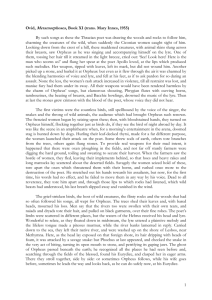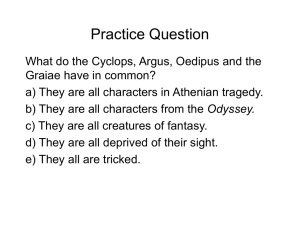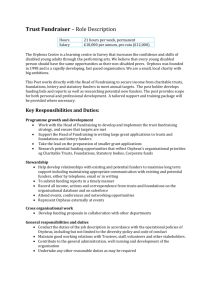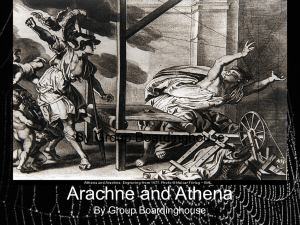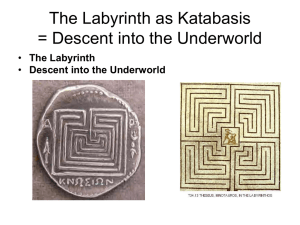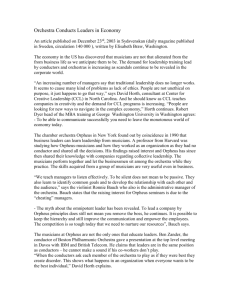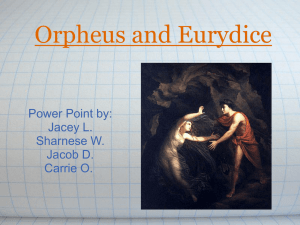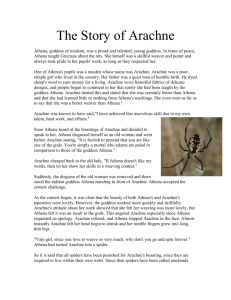Response from Krista Dukes
advertisement
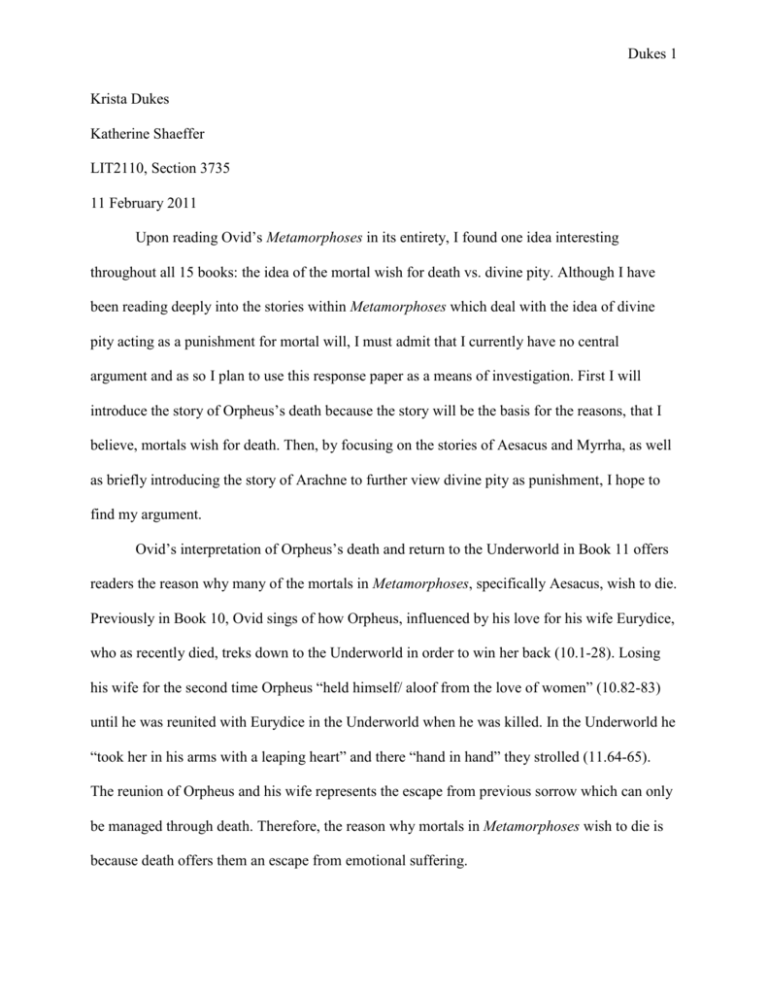
Dukes 1 Krista Dukes Katherine Shaeffer LIT2110, Section 3735 11 February 2011 Upon reading Ovid’s Metamorphoses in its entirety, I found one idea interesting throughout all 15 books: the idea of the mortal wish for death vs. divine pity. Although I have been reading deeply into the stories within Metamorphoses which deal with the idea of divine pity acting as a punishment for mortal will, I must admit that I currently have no central argument and as so I plan to use this response paper as a means of investigation. First I will introduce the story of Orpheus’s death because the story will be the basis for the reasons, that I believe, mortals wish for death. Then, by focusing on the stories of Aesacus and Myrrha, as well as briefly introducing the story of Arachne to further view divine pity as punishment, I hope to find my argument. Ovid’s interpretation of Orpheus’s death and return to the Underworld in Book 11 offers readers the reason why many of the mortals in Metamorphoses, specifically Aesacus, wish to die. Previously in Book 10, Ovid sings of how Orpheus, influenced by his love for his wife Eurydice, who as recently died, treks down to the Underworld in order to win her back (10.1-28). Losing his wife for the second time Orpheus “held himself/ aloof from the love of women” (10.82-83) until he was reunited with Eurydice in the Underworld when he was killed. In the Underworld he “took her in his arms with a leaping heart” and there “hand in hand” they strolled (11.64-65). The reunion of Orpheus and his wife represents the escape from previous sorrow which can only be managed through death. Therefore, the reason why mortals in Metamorphoses wish to die is because death offers them an escape from emotional suffering. Dukes 2 Using Orpheus’s death as the basis for the reason behind mortals’ wish for death, a reader can easily discern why Aesacus wishes for death. Hesperia, the one whom Aesacus is pursuing, is bitten by a snake and dies while Aesacus is chasing after her. Struck by grief for the loss of the one he loves, Aesacus throws himself off a cliff in an attempt to commit suicide and escape his emotional suffering. However, Tethys pities him and turns him into a diving bird (11.772-785). By turning him into a diving bird, Tethys is actually punishing Aesacus, because although his form has changed, the guilt he feels inside his soul remains and he tries “endlessly to take the road to death” (11.791) in order to be relieved of his feelings. Unlike Aesacus, who wishes for death, Myrrha wishes to “neither die nor live” (10.485) and is turned into a myrrh tree. Whereas story of Orpheus’s death maintains the idea that a mortal can only escape the turmoil of their life through death, Myrrha, by doing the opposite and asking to be held in a realm between the life and death, further supports the idea represented by Orpheus’s death. Myrrha, who having just escaped being killed by her father, is scared of death and believes that the only way to be relieved of her emotional turmoil is to be held in this realm in between life and death. Thus, she is transformed into a tree, yet she still has the same feelings. Similar to Aesacus, Myrrah’s form has changed, but the feelings of her soul are the same and “still she weeps” (10.500) because of those feelings. Instead of displaying the idea that a mortal can only escape the turmoil of their life through death, Arachne’s transformation portrays exactly what the pity of gods becomes: a punishment, similar to Aesacus’s. Arachne, unable to endure the torture of Pallas attempted to kill herself and Pallas, pitying Arachne, turns her into a spider. Therefore, a reader would be able to conclude that Arachne’s transformation is a form of punishment because she is forced to continue weaving and is never able to escape Pallas’s torment. Dukes 3 In conclusion, through my investigation of the mortal wish for death vs. divine pity, as seen through the story of Orpheus’s death and the transformations of Aesacus, Myrrha and Arachne, I have found that the only way a mortal is able to escape their emotional sufferings, throughout Metamorphoses, is through death. I have also found that when a mortal’s wish for death is interrupted by the pity of a god, as seen in Arachne’s story, pity becomes an everlasting form of punishment.
